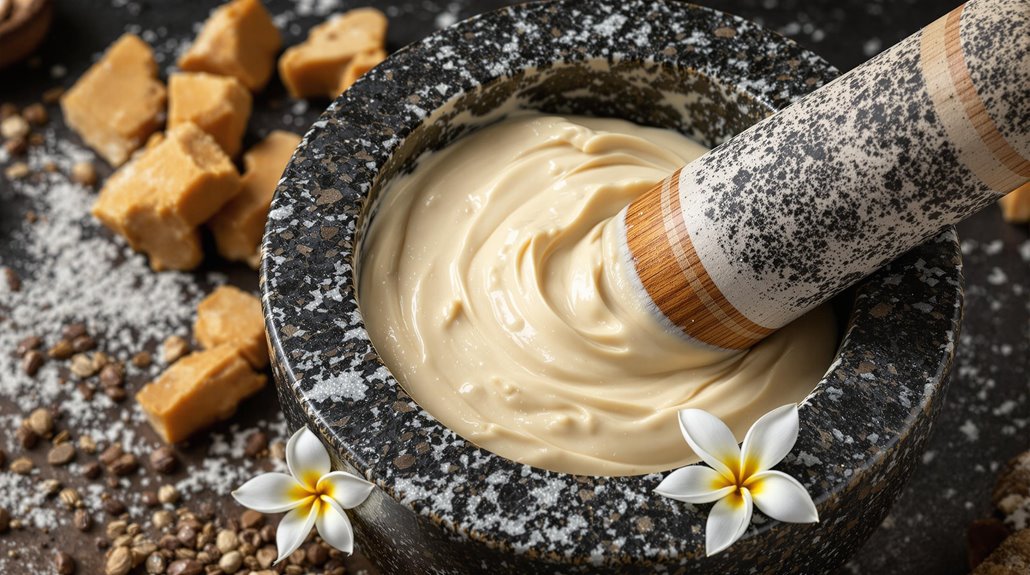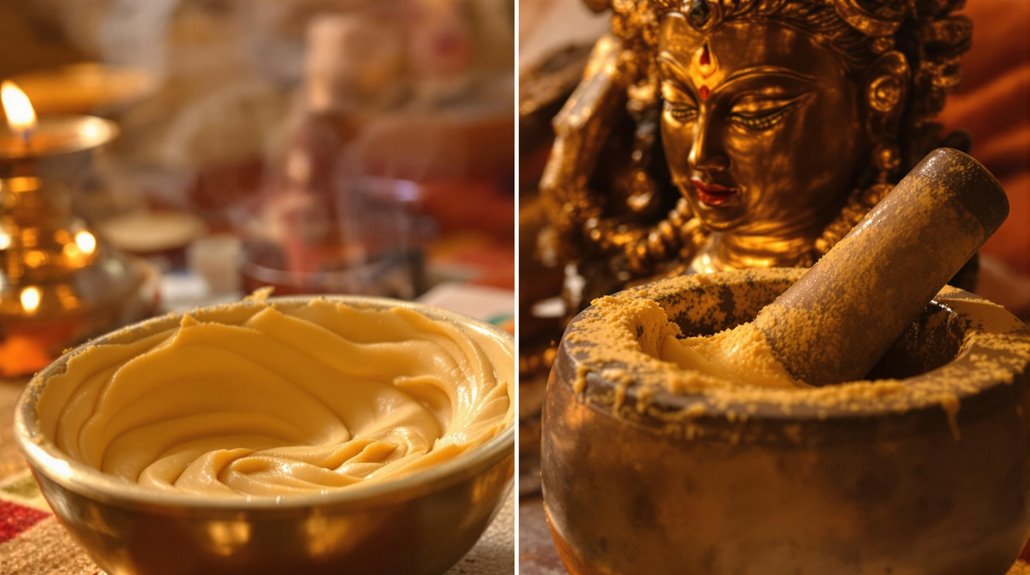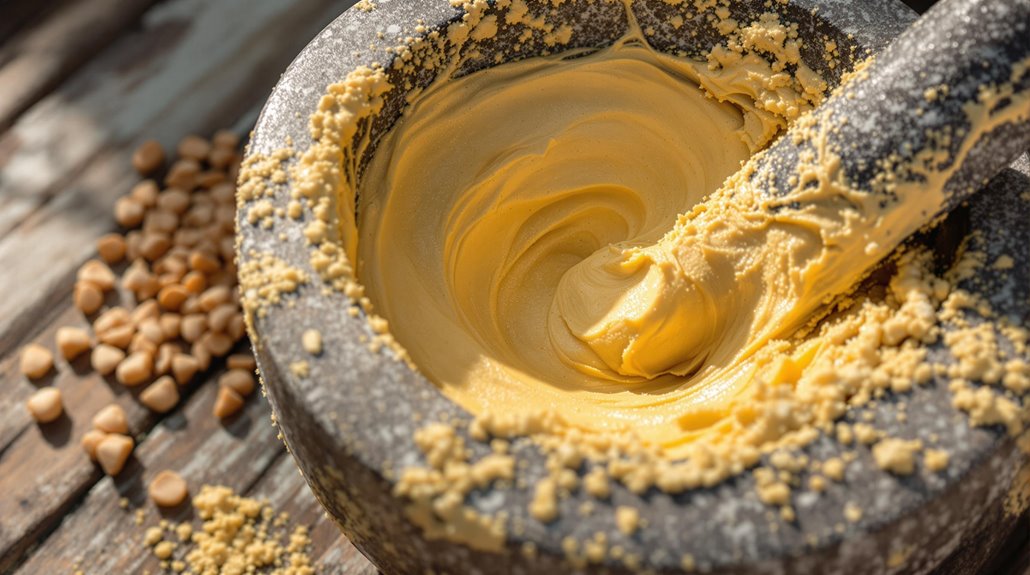What Is Sandalwood Paste and How Is It Used?

Sandalwood paste is a sacred compound you'll find in both Hindu religious traditions and modern skincare routines. When you grind sandalwood heartwood with water, it creates a creamy paste rich in natural oils and beneficial properties. You'll see it applied to foreheads in temples as a spiritual mark and used extensively in religious ceremonies to sanctify objects and spaces.
The paste offers impressive skincare benefits too, with anti-inflammatory and antimicrobial properties that can soothe irritated skin, fight acne, and provide cooling relief. There's much more to uncover about this ancient and versatile substance that bridges spiritual traditions with practical applications.
Origins and Sacred Significance
Spirituality and tradition intertwine in the sacred history of sandalwood paste, a revered substance deeply embedded in Hindu culture. For thousands of years, you'll find this aromatic paste, known as "Chandan" or "Chandana," at the heart of Hindu religious practices, where it's cherished for its divine properties and spiritual significance.
When you visit Hindu temples, you'll see sandalwood paste being used extensively in rituals and ceremonies. Devotees apply it to their foreheads, necks, and chests as a symbol of devotion, while priests use it to mark religious objects and decorate deities. At the famous Tirupati temple in South India, you'll experience a unique tradition where sandalwood paste is applied after religious head-shaving ceremonies, offering both spiritual and practical benefits.
In both Hinduism and Ayurveda, you'll explore that sandalwood paste isn't just a religious symbol - it's believed to be a powerful spiritual tool. When you use this sacred substance, you're participating in an ancient practice that's thought to purify your spirit, calm your mind, and strengthen your connection to the divine domain.
Traditional Preparation Methods
As you grind the Sandal heartwood, you'll need to add water gradually, creating a thick, creamy consistency that's perfect for various religious and therapeutic uses. The slow, methodical grinding guarantees that the sandalwood oil and its beneficial properties are fully extracted and preserved in the paste. When you apply sandal paste, particularly after ceremonies like the tonsure rituals at Tirupati temple, you're participating in a practice that's both sacred and practical. The paste soothes and protects your skin while carrying deep spiritual significance. Traditional artisans continue to mark religious utensils and prepare this paste by hand, maintaining the authenticity and potency of this ancient practice. This scrupulous preparation ensures you're getting the full therapeutic and aromatic benefits that've made sandalwood paste so valued throughout history.
Religious and Ceremonial Applications

Deep within Hindu spiritual traditions, sandalwood paste holds momentous ceremonial significance that touches nearly every aspect of religious practice. You'll find this sacred substance being used extensively in temples of Lord Krishna and other deities, where it's applied to protect and sanctify various religious items. From marking utensils and to decorate sacred objects, sandalwood paste serves as a bridge between the material and spiritual domains.
When you visit Hindu temples, you'll notice how this aromatic paste plays a central role in the bathing of gods and the adornment of deity idols. It's carefully applied to sacred items like Malas-Rosaries, Rudraksh Beads, and religious symbols called yantras. In both Hinduism and Ayurveda, the application of sandalwood paste carries deep spiritual meaning. You'll see devotees marking their foreheads, necks, and chests with this paste during rituals and ceremonies, believing it brings them closer to the divine.
The paste is also distributed as consecrated gifts in temples, allowing worshippers to take part in this ancient tradition. Whether it's marking religious implements or anointing sacred spaces, sandalwood paste remains an indispensable element of Hindu worship.
Skin Benefits and Properties
Beyond its spiritual significance, sandalwood paste offers unparalleled benefits for skin health and beauty. Its powerful combination of anti-inflammatory, antimicrobial, and antiseptic properties works to soothe irritated skin while fighting acne-causing bacteria. The paste's natural antioxidants protect your skin cells from free radical damage, helping prevent premature aging and enhancing skin elasticity.
You'll find that sandalwood paste acts as an astringent, effectively tightening your skin and reducing the appearance of enlarged pores. If you're dealing with skin conditions like eczema, psoriasis, or dermatitis, its cooling properties can provide welcome relief, making it particularly suitable for sensitive skin. The paste's gentle yet effective nature helps balance your skin's natural functions while promoting healing.
When combined with complementary ingredients like honey, cucumber, or turmeric, sandalwood paste becomes even more powerful in addressing skin discoloration. You can use it to lighten stubborn tan lines, dark spots, and old scars. Its natural moisturizing properties help maintain your skin's hydration levels, leaving you with a smoother, more radiant complexion.
Sustainability and Quality Considerations

The global sandalwood market faces critical sustainability challenges as wild populations dwindle due to over-harvesting. This depletion has pushed governments to enforce strict regulations protecting wild sandalwood forests, making sustainable sourcing more pivotal than ever.
To address these concerns, you'll find that reputable suppliers are now turning to sandalwood plantations as an ethical alternative. Companies like Heartwood, which holds Climate Active certification, demonstrate how sustainable practices can help preserve natural resources while maintaining product quality. When you're shopping for sandalwood products, it is necessary to verify their authenticity and source, as the market sometimes faces quality concerns.
You can support sustainability efforts by choosing products from companies that rely on certified sandalwood plantations. These plantations not only guarantee a reliable supply for future generations but also help protect remaining wild sandalwood populations. By selecting products from reputable suppliers who prioritize sustainable practices, you're contributing to the industry's long-term viability while getting genuine, high-quality sandalwood.
This approach helps balance commercial demands with environmental preservation, ensuring that this precious resource remains available for years to come.




